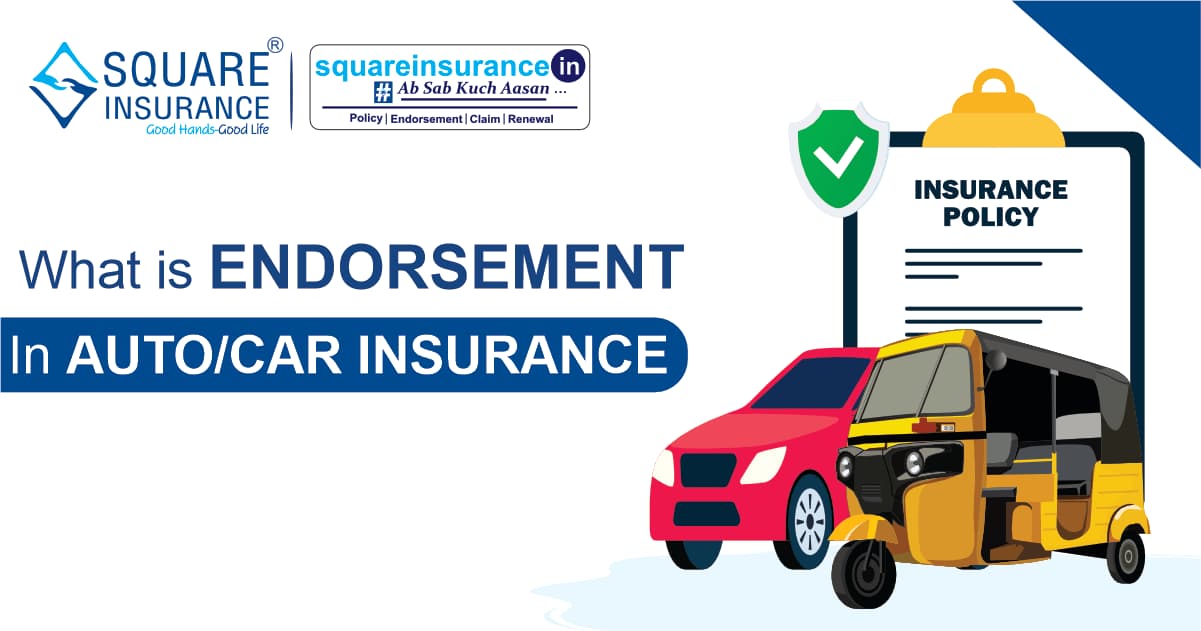
Many changes occur in our lives with each passing day. The same applies to our vehicles and their insurance needs.
Sometimes, you want to change your car’s details, update your address, add a new accessory, or even transfer ownership. Instead of buying a new policy every time, insurance companies offer a simple solution called an endorsement.
In car insurance, an endorsement is an official change or update made to your existing policy. In this guide, we will discuss endorsement, its need, and how to get it easily.
What is Endorsement in Insurance?
An endorsement in car insurance means making a change or adding something new to your current policy without buying a new one. It is like updating your policy to match your current situation.
For example, you might need an endorsement if you change your address, add a new driver, or fix a mistake in your policy. This keeps your car insurance correct and makes sure you have the right protection at all times.
How Often Can You Request an Endorsement?
Insurance companies expect you to update your policy when your situation changes. Typically, one endorsement per year is sufficient, but you can request more if needed. Some people make multiple adjustments throughout the year, even several times a month.
But this is not recommended. Too many changes can lead to errors, which may cause delays or extra costs during claims.
Types of Endorsement in Car Insurance (Auto Insurance Endorsement)
There are mainly two types of endorsement in insurance:
1Financial Endorsement
A financial endorsement in car insurance refers to any change in your policy that affects the premium amount. These modifications often involve adjustments to your vehicle's details or coverage terms, leading to an increase or decrease in the insurance cost.
1.1Common Financial Endorsements in Insurance
- Change in Insured Declared Value (IDV): Altering the IDV, which is the estimated market value of your car, can impact your premium.
- Modification of Cubic Capacity (CC): Updating the engine's cubic capacity may lead to a premium adjustment.
- Change in Fuel Type: Switching between petrol, diesel, or alternative fuels like CNG/LPG affects the risk assessment and, consequently, the premium.
- Alteration in Manufacturing Date: Correcting or updating the vehicle's manufacturing date can influence the premium calculation.
- Adjustment of Insurance Period: Extending or reducing the policy duration requires recalculating the premium.
- Transfer of Ownership: When selling or purchasing a used car, transferring the policy to the new owner involves a financial endorsement.
1.2Fees Associated with Financial Endorsements
The charges for these endorsements vary based on the insurer and the specific change requested. Fees can range from as low as ?10 to as high as ?500. For example, adding a paid driver might cost around ?50, while changing the IDV could incur a higher fee.
Some endorsements may also require an inspection of the vehicle, depending on the insurer's policies.
2Non-Financial Endorsement
A non?financial endorsement is a change made to an insurance policy that does not affect the premium, such as correcting personal details (name, date of birth), updating contact information, or fixing vehicle identification numbers. The insurance company does not charge any extra fee for non-financial endorsements.
2.1Common non-financial endorsements in Insurance:
- Correcting personal details like date of birth or gender.
- Updating your contact information or address.
- Fixing vehicle identifiers such as chassis number, engine number, color, or registration number.
- Adding/removing hypothecation, GST number, or salutation.
- Changing nominee details or policyholder type (e.g., adding a spouse).
Benefits of Car Insurance with Endorsements
Here are some benefits of a car/auto insurance endorsement:
- Enhances accuracy – Keeps your policy updated with correct vehicle and driver details, supporting smooth claim processing and faster settlements.
- Boosts peace of mind – Aligns coverage with your current needs and budget, ensuring financial protection in case of damage or loss.
- Offers customizable coverage – Helps you add or remove specific coverages and add-ons as your requirements change, without buying a new policy.
- Ensures legal compliance – Maintains adherence to traffic regulations and insurer rules, minimizing the risk of claim denial or administrative delays.
Conclusion
An endorsement in auto insurance is an official amendment to your policy that allows you to add, remove, or adjust coverage without needing a completely new contract. It helps ensure your policy reflects changes such as vehicle upgrades, personal details, or desired add-ons.
By using endorsements, you can easily adjust your car insurance, like adding roadside assistance or updating the car’s IDV, without getting a new policy. Once your insurer approves the endorsement, it becomes part of your legal agreement and stays in effect for the rest of the policy term.
Also Know - List of Top-Rated Auto Insurance Providers in India
An endorsement is an official change to your current policy. It can add, remove, or adjust coverage so your policy fits your needs better.
For example, you might add coverage for expensive jewelry or include roadside assistance in your car insurance. These additions are called endorsements.
You typically do not pay a separate fee just for the endorsement itself. Instead, your premium may go up or down based on the adjusted coverage.
They are optional but useful. If your situation changes, like buying new valuables or needing extra protections, endorsements let you update your policy without replacing it.
An endorsement stays valid for the duration of your policy unless it specifies a shorter period. It can be added at purchase, renewal, or mid-term.
Here are the two main types of insurance endorsements:
- Financial Endorsements
- Adding or removing coverage (e.g., extra riders, accident protection)
- Changing insured value (like IDV), fuel type, and vehicle accessories
- Transferring ownership
- Non‑Financial Endorsements
- Correcting or updating personal details (name, address, contact info)
- Fixing vehicle information (engine/chassis number, color, registration)
- Updating the nominee, hypothecation, GST number, or policyholder type
